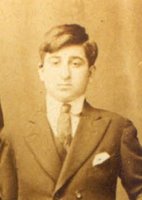The Colorful Dead
This evening after work, Joe and I met up with our former housemate P to attend a lecture by D. Brenton Simons, the head of the Massachusetts Historic Genealogical Society. Simons spoke on his recent book, Witches, Rakes and Rogues: True Stories of Scam, Scandal, Murder, and Mayhem in Boston, 1630 – 1775. I picked up the book several weeks ago at Calamus and intended to have finished it in anticipation of this evening’s talk, but I’ve been reading Strangers: Homosexual Love in the Nineteenth Century by Graham Robb, and it’s taken me longer to finish than anticipated.
Simons signed my copy, and I asked him if it contained any tales of sodomy, which certainly falls under the category of scandal for the period covered by his book. He admitted that he didn’t really attempt to cover this topic—though there were plenty of sodomy trials during the colonial era—because a book on this very topic is currently being written. I shared with him a reference I came across many years ago in the journal of Francis Higginson, a Puritan minister who arrived in Massachusetts in 1629. On board the Talbot, Higginson discovered “six beastly sodomitical boys,” and when the ship arrived in Salem, Higginson turned the boys over to John Endicott, the acting governor. Rather than arresting the boys, Endicott simply sent them back to England. At the time, English law would have allowed him to exert a much harsher punishment, but he chose to show leniency, which was not atypical of the period, even for Puritans.
Afterwards, Joe and I drove to Lynn to see my parents. It seemed only fitting after attending a lecture by the head of the Massachusetts Historic Genealogical Society (and because this past Monday was Memorial Day) that we would pay a visit to Pine Grove cemetery to inspect the recently tended to gravesites of my ancestors. The last time I visited the cemetery was last Thanksgiving. That day, we visited only a few sites—my grandparents’ graves and the gravesite of my father’s cousin who was killed as a teenager in a vendetta as part of a love triangle.
 Today, we visited everyone: my grandparents (both sets), my great grandparents (maternal grandmother’s parents), my father’s cousin, three of my uncles, my godfather, and my great uncle Jimmy Vranas (maternal grandmother’s brother, pictured left circa 1919). I can never remember the exact spot where he’s buried. I relied on my dad to find it, though Joe also remembered its location.
Today, we visited everyone: my grandparents (both sets), my great grandparents (maternal grandmother’s parents), my father’s cousin, three of my uncles, my godfather, and my great uncle Jimmy Vranas (maternal grandmother’s brother, pictured left circa 1919). I can never remember the exact spot where he’s buried. I relied on my dad to find it, though Joe also remembered its location.
Uncle Jim never married. He bounced from odd job to odd job, his older sister (my grandmother) slipping him extra money whenever she could. He drank and gambled, but was a kind soul by all accounts. I’ve never heard any tales of womanizing. When I came out to my parents ten years ago, almost immediately my mother said rather pensively, “Well, Uncle Jim never married. Maybe he was gay,” as if she were looking for a genetic explanation for my homosexuality.
I don’t know whether Uncle Jim was gay or not. I don’t know whether in his day a confirmed bachelor was viewed with suspicion. I don’t know whether homosexuality was visible enough to the Greek-American community during the first half of the twentieth century for anyone to have given much thought to his perpetual bachelorhood. Surely they were aware of men having sex with other men, but probably didn’t talk about it. Certainly gay men prior to Stonewall did not have the freedom to come out and love each other openly, as gay men (in some parts of the world) can do today.
If Uncle Jim were gay, he kept his secret well hidden, or at least that’s how it seems to me. I’ve never been able to learn much about him from my mother’s older siblings. All they ever seem to say is that he lived “from hand to mouth.” My grandmother has been dead almost two decades, and I don’t ever recall her talking much about him, though clearly she had a soft spot for him. Perhaps she knew the secrets that he kept hidden away in his heart. Our lives never overlapped; he died three years before I was born.
The sun had just about set as we drove along the gracefully curving and tree-lined roads to the section where Uncle Jim is buried. On the car stereo we were listening to Manes Neva Tsifte Telli, recorded in 1934 by Dimitris Atraïdis accompanied by Dimitris Semsis (Salonikios) on violin, Agapios Tomboulis on oud, and Lambros Savaïdis on kanun. Atraïdis sings:
Click here to listen.
I have not yet found a satisfactory English translation of μερακλής (pl. μερακλήδες), pronounced “me-ra-KLEES.” It refers to someone who is passionate and who has experienced pain and longing enough to know that life is short, and so pursues pleasure whenever s/he can. In a way, to be a μερακλής is to be a bit manic; to move between the extremes of great sorry and depression, on one hand, and great joy, on the other.
In Greek mythology Charon is the spirit who ferries souls across the River Styx to the Underworld, or Hades. What better song to listen to while driving through a city of the dead to visit a great uncle who was the quintessential μερακλής? When I look at his photo as a young man (the only photo I have of him) I see sadness and longing. His face betrays his loneliness. What did he long for? And, more importantly, how is he getting on in Hades without it?
Simons signed my copy, and I asked him if it contained any tales of sodomy, which certainly falls under the category of scandal for the period covered by his book. He admitted that he didn’t really attempt to cover this topic—though there were plenty of sodomy trials during the colonial era—because a book on this very topic is currently being written. I shared with him a reference I came across many years ago in the journal of Francis Higginson, a Puritan minister who arrived in Massachusetts in 1629. On board the Talbot, Higginson discovered “six beastly sodomitical boys,” and when the ship arrived in Salem, Higginson turned the boys over to John Endicott, the acting governor. Rather than arresting the boys, Endicott simply sent them back to England. At the time, English law would have allowed him to exert a much harsher punishment, but he chose to show leniency, which was not atypical of the period, even for Puritans.
Afterwards, Joe and I drove to Lynn to see my parents. It seemed only fitting after attending a lecture by the head of the Massachusetts Historic Genealogical Society (and because this past Monday was Memorial Day) that we would pay a visit to Pine Grove cemetery to inspect the recently tended to gravesites of my ancestors. The last time I visited the cemetery was last Thanksgiving. That day, we visited only a few sites—my grandparents’ graves and the gravesite of my father’s cousin who was killed as a teenager in a vendetta as part of a love triangle.
 Today, we visited everyone: my grandparents (both sets), my great grandparents (maternal grandmother’s parents), my father’s cousin, three of my uncles, my godfather, and my great uncle Jimmy Vranas (maternal grandmother’s brother, pictured left circa 1919). I can never remember the exact spot where he’s buried. I relied on my dad to find it, though Joe also remembered its location.
Today, we visited everyone: my grandparents (both sets), my great grandparents (maternal grandmother’s parents), my father’s cousin, three of my uncles, my godfather, and my great uncle Jimmy Vranas (maternal grandmother’s brother, pictured left circa 1919). I can never remember the exact spot where he’s buried. I relied on my dad to find it, though Joe also remembered its location.Uncle Jim never married. He bounced from odd job to odd job, his older sister (my grandmother) slipping him extra money whenever she could. He drank and gambled, but was a kind soul by all accounts. I’ve never heard any tales of womanizing. When I came out to my parents ten years ago, almost immediately my mother said rather pensively, “Well, Uncle Jim never married. Maybe he was gay,” as if she were looking for a genetic explanation for my homosexuality.
I don’t know whether Uncle Jim was gay or not. I don’t know whether in his day a confirmed bachelor was viewed with suspicion. I don’t know whether homosexuality was visible enough to the Greek-American community during the first half of the twentieth century for anyone to have given much thought to his perpetual bachelorhood. Surely they were aware of men having sex with other men, but probably didn’t talk about it. Certainly gay men prior to Stonewall did not have the freedom to come out and love each other openly, as gay men (in some parts of the world) can do today.
If Uncle Jim were gay, he kept his secret well hidden, or at least that’s how it seems to me. I’ve never been able to learn much about him from my mother’s older siblings. All they ever seem to say is that he lived “from hand to mouth.” My grandmother has been dead almost two decades, and I don’t ever recall her talking much about him, though clearly she had a soft spot for him. Perhaps she knew the secrets that he kept hidden away in his heart. Our lives never overlapped; he died three years before I was born.
The sun had just about set as we drove along the gracefully curving and tree-lined roads to the section where Uncle Jim is buried. On the car stereo we were listening to Manes Neva Tsifte Telli, recorded in 1934 by Dimitris Atraïdis accompanied by Dimitris Semsis (Salonikios) on violin, Agapios Tomboulis on oud, and Lambros Savaïdis on kanun. Atraïdis sings:
Αμάν, το Χάρο τον ρωτήσανε πεντ’έξη μερακλήδες
δίχως κρασί πώς την περνούν στον Άδη οι μπεκρήδες.
Aman, fifty-six μερακλήδες asked Charon
how drunken bums manage in Hades without wine.
Click here to listen.
I have not yet found a satisfactory English translation of μερακλής (pl. μερακλήδες), pronounced “me-ra-KLEES.” It refers to someone who is passionate and who has experienced pain and longing enough to know that life is short, and so pursues pleasure whenever s/he can. In a way, to be a μερακλής is to be a bit manic; to move between the extremes of great sorry and depression, on one hand, and great joy, on the other.
In Greek mythology Charon is the spirit who ferries souls across the River Styx to the Underworld, or Hades. What better song to listen to while driving through a city of the dead to visit a great uncle who was the quintessential μερακλής? When I look at his photo as a young man (the only photo I have of him) I see sadness and longing. His face betrays his loneliness. What did he long for? And, more importantly, how is he getting on in Hades without it?












0 Comments:
Post a Comment
<< Home